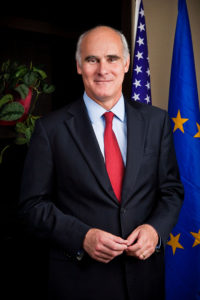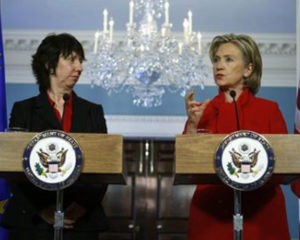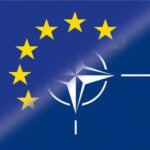 What is the state of the Union? Where is the EU heading? Will it survive the current economic, democratic, and financial crises? These were some of the questions raised and tackled during a day-long workshop sponsored by the EU Center of Excellence at the University of Miami. Not only are the questions important, but the lineup of discussants was quite a cast with international experts such as Doctors Boening, Howorth, Koops, Laursen, Lorca-Susino, McCormick, Malamud, Roy, Schimdt, Thiel, Tovias, and Zestos, among many other excellent scholars.
What is the state of the Union? Where is the EU heading? Will it survive the current economic, democratic, and financial crises? These were some of the questions raised and tackled during a day-long workshop sponsored by the EU Center of Excellence at the University of Miami. Not only are the questions important, but the lineup of discussants was quite a cast with international experts such as Doctors Boening, Howorth, Koops, Laursen, Lorca-Susino, McCormick, Malamud, Roy, Schimdt, Thiel, Tovias, and Zestos, among many other excellent scholars.
The EU Ambassador to the US, Joao Vale de Almeida, a very articulate and eloquent individual, opened the conference with a short, but sharp analysis on the state of the Union. As any good European politician and diplomat would, he emphasized throughout his talk that the EU is in permanent development; it is a work in progress and should be seen as such. Despite the current crisis, the EU remains a success story considering that it has accomplished its original goal, regional peace. He claimed that “we can’t discuss the state of the Union if we don’t take into consideration the historical evolution of the EU.” Furthermore, in today’s world, considering the global context and the power of globalization, it would be a mistake to think that the EU Member States can live without the Union, as extreme right- and left-wing European parties have advocated.
European politician and diplomat would, he emphasized throughout his talk that the EU is in permanent development; it is a work in progress and should be seen as such. Despite the current crisis, the EU remains a success story considering that it has accomplished its original goal, regional peace. He claimed that “we can’t discuss the state of the Union if we don’t take into consideration the historical evolution of the EU.” Furthermore, in today’s world, considering the global context and the power of globalization, it would be a mistake to think that the EU Member States can live without the Union, as extreme right- and left-wing European parties have advocated.
However, he underlined three problems: first, the EU and its member states need to reinforce their common capabilities by pooling them in order to intervene on the international stage. This should be accompanied by increased cooperation with the U.S. Second, the member states need to solve the financial crisis. The EU Ambassador argued that “it is not a crisis of the EU,” but rather a sovereign debt crisis. Third, member states need to strengthen their unity in order to be more active on world stage. Following his speech, he fielded several questions, most of which were about the economic crisis. However, the last one concerned the current relations between the EU and U.S. on the Syrian crisis. His answer did not reveal any new information outside the fact that High Representative Ashton and Secretary Clinton met last week and see eye-to-eye on the Syrian problem. He called for the need to bolster international consensus and to engage with  Russia and China in order to truly have a common international vision. Last, he expressed his hope concerning Ban Ki Moon’s appointment of former UN Secretary General Kofi Annan as the Joint UN-Arab League Envoy on the Syrian crisis. His bottom line was the need to advance on humanitarian and political tracks.
Russia and China in order to truly have a common international vision. Last, he expressed his hope concerning Ban Ki Moon’s appointment of former UN Secretary General Kofi Annan as the Joint UN-Arab League Envoy on the Syrian crisis. His bottom line was the need to advance on humanitarian and political tracks.
Following the opening speech, the conference was composed of four panels, each looking at a core component of the state of the Union: first, the purpose of the EU; second, the Eurozone; third, the external dimension of the EU; and fourth, the EU as a model of regional integration. The first two panels as well as the last one were very insightful but will not be analyzed here (the articles of each presentation will be accessible online in the coming month). The focus of this blog is instead inspired by Howorth’s presentation, entitled, “European Union as a Model for Regional Regimes Worldwide.” His research question is quite simple: is the EU a real model for other regional regimes? His argument is that each regional regime, including the EU, has emerged for very specific geopolitical and geographic reasons. Each regime – such as ASEAN, MERCOSUR, ALBA, EU, among others – is unique. It is quite difficult to “copy” the EU as it was created because of European problems and for European problems. The EU is a unique entity often referred to by the academic community as sui generis, and ultimately difficult to label. The pooling of sovereignties in Europe undeniably pushes the physical and cognitive boundaries of the traditional Westphalian state. Instead of speaking of a sui generis actor, Dr. Schmidt has advocated for calling the EU a region-state. Her argument is that the concept of region-state has not yet entered our mind, and it is just a matter of discursive construction. We once had the city-state, the nation-state, and the member-state. Why not the region-state?
One of the questions asked to the external relations panelists was: what is the future of the CSDP in the context of crisis? Dr. Howorth argued that even if the euro blows up, it may not change much. However, the EU needs to do more with the resources and capabilities available. Fifty percent of the  CSDP budget comes from just two countries – France and the UK. The EU needs to build up its hard power in order to secure its neighborhood. The European neighborhood has become extremely volatile these last years. Howorth also argued that the CSDP and NATO must merge. The US does not care anymore about NATO and it is time to see the Europeans become more involved and lead the way on the regional chessboard. Dr. Koops added that the expectations on the CSDP have been quite high considering its recent existence. In ten years, since the deployment of the first mission in 2003, the EU has deployed 25 CSDP missions. HR Solana was focusing on the deployment of CSDP operations, with an average of two per year during his mandate, whereas HR Ashton has instead focused on starting EU diplomacy. The change of culture and vision of the leadership could be an important variable in explaining a slower and more frigid deployment of CSDP missions.
CSDP budget comes from just two countries – France and the UK. The EU needs to build up its hard power in order to secure its neighborhood. The European neighborhood has become extremely volatile these last years. Howorth also argued that the CSDP and NATO must merge. The US does not care anymore about NATO and it is time to see the Europeans become more involved and lead the way on the regional chessboard. Dr. Koops added that the expectations on the CSDP have been quite high considering its recent existence. In ten years, since the deployment of the first mission in 2003, the EU has deployed 25 CSDP missions. HR Solana was focusing on the deployment of CSDP operations, with an average of two per year during his mandate, whereas HR Ashton has instead focused on starting EU diplomacy. The change of culture and vision of the leadership could be an important variable in explaining a slower and more frigid deployment of CSDP missions.
I will end this review of the conference with a statement that has since left me thinking. Dr. Malamud claimed when talking about the other regional regimes, and this applies to the EU as well, that “integration is not an end in itself. The real goal is instead growth, stability and peace. If these goals can be attained even without further integration, so be it.” Maybe the error made by our European elected and non-elected officials is to focus solely on fostering integration rather than on identifying and implementing needed solutions- even if it goes against the idea of an ‘ever-closer’ Union.
An edited volume combining all the papers will be accessible for free as a PDF document on the EU Center’s website by the end of April at http://www.as.miami.edu/eucenter/publications/books